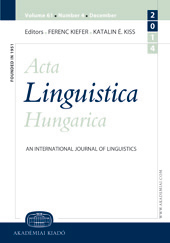Modal adverbs in Hungarian (The case of talán ‘perhaps’)
Modal adverbs in Hungarian (The case of talán ‘perhaps’)
Author(s): Nóra KuglerSubject(s): Pragmatics, Finno-Ugrian studies
Published by: Akadémiai Kiadó
Keywords: modal adverbs; subjective epistemic modality; inferential evidentiality; subjectification;
Summary/Abstract: This paper discusses epistemic modal adverbs in Hungarian from a functional perspective. It argues that epistemic modal adverbs indicate several operations that are closely interconnected: on the one hand, they indicate the fact that the speaker presents the event represented in the sentence as a possibility rather than as a fact (thereby opening the dimension of epistemic modality for its interpretation); on the other hand, they signal that the evaluation of likelihood comes from the speaker, that the specification of the degree of probability of the given event is based on the speaker’s inference (setting the domain of evidentiality into motion). Both of these functions can be interpreted as part of the operation of subjectification, identifying the speaker as the subject of consciousness. The author assumes that Hungarian exhibits a modalized system of representing evidence; she takes epistemic modality and evidentiality to be partially overlapping domains.The paper gives an overview of inferential-epistemic modal adverbs in Hungarian. In a corpus-based analysis of the lexeme talán ‘perhaps’, it discusses its inferential-epistemic functions, as well as the paths of leaving the modal domain.
Journal: Acta Linguistica Hungarica (Since 2017 Acta Linguistica Academica)
- Issue Year: 57/2010
- Issue No: 1
- Page Range: 75-98
- Page Count: 24
- Language: English

